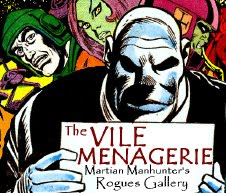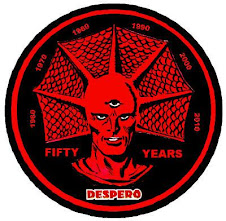Dru-Zod owes his heritage to the likes of Ares and Zeus, conquerers set on subjugation. Commander Blanx sentenced Mars to die as a contractual stipulation of his selling the planet to some aliens. He literally sold out the lives of his people for profit, and while he may have postured and speechified about how they'd grown weak from lack of combat, ideology was clearly less of a concern than personal enrichment. The combination of profit motive and retaliatory action places Blanx in the Businessman/Traitor aspect of the Apollo archetype. The villainous side of Apollo is shared by Gordon Gekko, Speed's mad bomber Howard Payne, and Ebenezer Scrooge. The Traitor feels undervalued, desiring his due respect and admiration. He is motivated by a personal code of conduct and a drive toward order under his subjective terms. These terms may not conform to an objective morality, but Apollo abides by his own rules and is the hero of his own story. The Traitor is a company man, seeing himself as a chess master moving devoted pieces about the board for the greater good, but any sense of loyalty is lost if the Traitor himself feels betrayed by his people or organization. One line in the description of the archetype is especially telling: "If he sees his company facing disaster, he'll go to extreme lengths to cover up any wrongdoing."
Let's look at how the Apollonian Traitor archtype is determined to best suit Commander Blanx based on canon, and how it should reflect on Blanx with any future usage. The white-skinned polar Martians invaded the lands of the green-skinned Desert Dwellers and attempted to take control of The Blue Flame of Mars for unrevealed reasons. Blanx was the pale Martian military leader, who defeated his opposition's equivalent, J'onn J'onzz. Blanx apparently wanted to execute J'onzz, but was prevented from doing so by popular opinion. Blanx later attempted to secretly murder J'onzz on Earth, but was again stopped by a greater power than himself, the prototype for the Justice League of America. Likewise, despite his new and incredibly powerful friends, J'onn J'onzz never tried to "liberate" his home planet, stating "The Mars I loved is gone! It is a world of lost causes and dead dreams! Evil triumphed over good there!" J'onzz repeatedly returned to Mars for brief visits without adverse consequence, but chose to live of Earth permanently. Meanwhile, whatever purpose Blanx had for taking control of the Blue Flame, he ultimately waited thirteen years to unleash its power to ravage Mars.
Clearly, Blanx would not have bided his time so long to simply destroy Mars, and if Blanx were the sole "evil" on the red planet, J'onzz would have returned home in 1959 as a conquering hero. There must have been an authority beyond either J'onzz or Blanx, whose corruption maintained J'onzz's exile and eventually drove Blanx to destroy his own world. Blanx was likely working in this authority's interests at the time of J'onzz's exile, but at some point was so frustrated in his drive that he became a traitor. Mars in the mid-20th century was considered a dying world, and J'onn J'onzz wished to use the Blue Flame to power a space program. Perhaps Blanx was offended by J'onzz's plans to "abandon" Mars, or he sought a means to renew/expand the power source, or maybe Blanx simply wanted to secure it for his own race. Blanx perhaps had the best of intentions, but at some point his overall strategy for Mars was thwarted, and his exit strategy went nuclear. It's possible he gained and lost what he desired and retaliated, or merely realized that all his plots on Mars were futile, so he sought a fresh start as the last of his kind.
Again, Blanx at least initially worked for the benefit of his people, which earned him trust and considerable leeway. Even as he was destroying Mars, he was assisted by loyalists who were either killed off-panel or somehow abdicated their legal identity as Martians to representation by Blanx for the purpose of the Commander's financial compensation as sole living owner of Mars' mineral rights. Blanx had to be empowered to stake this grandiose claim of entitlement while simultaneously disinheriting every other representative of his species. This plays into how to write the character. Commander Blanx is correct in everything he does in his own mind, anyone who disagrees is wrong, and are therefore subject to Blanx's judgment of fit punishment for their crime against his social order. Any government that does not abide must be torn down, while any individual must be taught a lesson or utterly destroyed as pronounced by Blanx.
One way to approach writing Blanx is through his subordinates. What did they know about Blanx's goals? Were they outright lied to, or simply mislead most grievously? Was it more systemic, like German soldiers consigned to an unjust cause without the strength to rebel, or were otherwise halted from doing so? Was Blanx seen as the last best hope of a doomed planet, and what then caused him to stray so far from the greater good? "When things get chaotic, his emotions fly out of control making him do things he never thought he could. His logical mind holds his emotions at bay, but when situations defy logic, his mind is pushed to the breaking point." Was he driven mad, or merely a product of circumstantial, banal acts of evil? Per Schmidt, Blanx would be a dispassionate perfectionist unwilling to let anything go to an obsessive degree. He would be utterly convinced in his righteousness and the fault lay in any who would dispute this. He enjoys proving himself with drawn out machinations against his foes. If his worth is not valued, he'll "liquidate" assets under his control to claim his due. Others can and should die for his cause, for he is a great man with a pristine vision of the future.
Speaking of which, should Blanx return, how would his arc play out? Would he learn life lessons to loosen up and enjoy the wonder of living itself? Or more likely, would he feel compelled to move on to the next business plan... the next culture to raid with hostility and profit from at the cost of lives and souls? Blanx would want to be cool, calm, and removed, allowing others to get their hands dirty while he reviews the quarterly report. He would seek challenges from contemporaries, so he could take satisfaction in demonstrating his overall superiority at the great game. He only wants what is denied him, and is contemptuous toward genuine affection. This is not a man with fellowship, defined instead by accomplishments and holdings. While sensible, he's a peacock who wants the sharpest mind and looks in any given room. J'Onn J'Onzz as a wise, humble recluse is the antithesis of Blanx, but Schmidt recommends exposing the Commander to greater sowers of chaos to bend this inflexible fiend. Imagine someone like Lobo as a spanner in his works to confound his efforts without any larger objective, or Bel Juz as a seductress who plays with the player's tightly wound emotions. The death of Mars was only the beginning of the possibilities for a villain who works his harmful ways across whole societies; a remorseless, conscienceless capitalist against the most socially aware of alien heroes...






























2 comments:
Blast, I had a comment written and the window locked up!
This is a fascinating and somewhat rewarding write-up of Blanx. I admit I haven't read the two issues of Justice League of America that Blanx appeared in. When I used the character in my fan-cast JL movie concept, I was basing him off of the things I remember you posting here. When I got around to the third movie (still have to finish writing the second!), I was going to reveal that Blanx betrayed the Martians to the invading alien force (spoiler: Mongul and a modified Warworld, or Despero -- haven't decided). I was definitely going to play up the "sold out his people" angle, and it's cool that you regard that as a critical part of his archetype.
Blanx is the slumlord who burns out a tenement to sell the lot to Starbucks, writ cosmic. Pretty unique for this magnitude of villain.
I'd favor Despero, since he's a 100% JLA villain, where guys like Mongul and Darkseid were merely borrowed from other franchises. Of course, I'm prone to overzealous conceptual purity in my dark moments.
Post a Comment